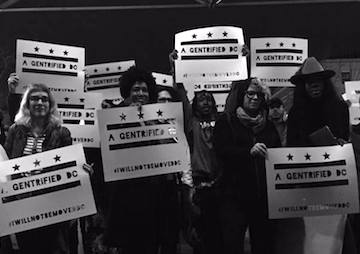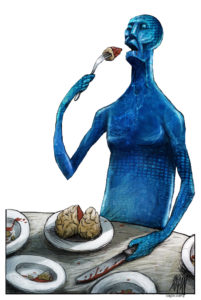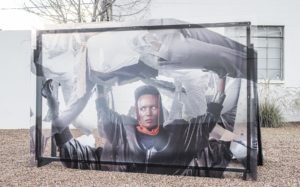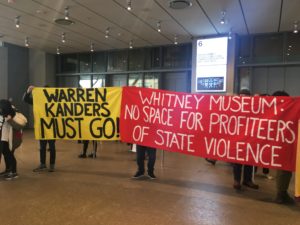The Mousai House — A Grass-Roots Model of a Cooperative Economy
Facing eviction from one of the last places for independent artists in Washington, D.C., a community banded together in a struggle against developers. 1
2
3
1
2
3

Artists and community members hold a demonstration outside the Washington, D.C., Zoning Commission’s hearing on the sale of the Union Arts building, home to Mousai House and dozens of other arts spaces. (The Next System Project)
Washington, DC is a city full of monuments. Some are fashioned from marble and stone. Some exist only in the minds and memories of everyday people. All of them preserve histories of crisis and triumph. This is the story of one of the District’s hidden monuments.
In 1975, the band Parliament released the album Chocolate City, forever immortalizing the mid-twentieth century demographic and cultural identity of the nation’s capital. In 1968, the assassination of Martin Luther King, Jr. sparked an urban rebellion and the mass exodus of white DC residents (a process that actually began over a decade earlier after the 1954 Brown v. Board of Education Supreme Court decision triggered white flight to the suburbs). By 1970, the city was 71 percent Black.
In 2011, DC’s Black population fell below 50 percent for the first time in more than five decades. According to census data cited in The Washington Post, between 2004 and 2014, the number of African-Americans living in the District dropped by nearly forty thousand. The process of gentrification and displacement has impacted not only the people but the culture of Washington, DC – a city that produced Duke Ellington, Roberta Flack, Marvin Gaye, Chuck Brown and iconic venues like Bohemian Caverns, which recently closed its doors on the historic U Street corridor. The Mousai House is a community of young artists that blossomed during this tumultuous period in the city’s history. In many ways the history of Mousai mirrors the history of Black Washington.
It is the story of a community who took run-down, forgotten spaces and made them vibrant with music, art, and culture. It’s the story of loss. As the artists of Mousai face displacement for the second time, they are laying the foundation for what could potentially be a game-changing shift in DC’s creative economy. They envision a new arts scene; one that the artists themselves control, where they pool their resources to purchase the buildings where they create, the equipment they need, and the spaces where they live.
On a small scale, Mousai is laying the foundation for what Dr. Jessica Gordon Nembhard calls a Cooperative Solidarity Commonwealth. She envisions this to be “a system of interlocking cooperative ownership structures in all industries and all sectors of the economy, where cooperatives and other community-based enterprises support one another by building linked supply chains, collaborating on projects, and sharing funding.” As a professor, economist, and author of the most comprehensive history of African-American cooperatives to date, Dr. Nembhard has spent years studying cooperatives as an economic survival strategy. The seeds of the next system have long been planted in low-income Black communities where cooperative principles and strategies are an integral part of everyday life. The Mousai House is one example of how cooperatives often begin informally to satisfy an economic or social need.
In the middle of a quiet, tree-lined street in Northeast DC’s Brookland neighborhood, there is a white house: 1015 Evarts Street NE. With peeling paint and a worn exterior, a passerby would likely never guess that this was a modern landmark of DC’s indie music scene. It was here, four years ago, that Gaje Jones began giving Tuesday night music lessons in his living room. Originally, he began the classes as a temporary escape from his nine to five job. It soon became clear that these music lessons filled an important community need. “Something I really believed in was that music and art should be accessible and it wasn’t accessible at the time,” Jones shared. “There was really nowhere you could go where you could have people coming in and teaching you how to play drums or guitar or bass; just because you wanted to learn, not necessarily because this was your professional career.”
Early on, a cadre of DC’s leading young musicians came on board to help teach. Obie Gereau taught keys and theory; Dante Pope taught voice, theory, and drums; and Ajene Harley taught guitar. One of the first guitar students was a local MC named Dior Ashley Brown.
Brown heard about the classes from her friend Ziggy who heard about them from her friend DJ Native Sun. She was no stranger to musical spaces as a graduate of the Duke Ellington School of the Arts, DC’s famed performing arts high school. Before Mousai, Brown had taken a number of music lessons throughout the city. “I was always in and out of somebody’s class until the point I couldn’t afford it.” She relied on Groupon and took classes until the deal ended, at which point she would have to stop attending. Aside from cost, Brown was searching for a space where she could both learn guitar and build community with like-minded people. Walking into her first class at Mousai, she knew she had found what she was looking for. “The vibe was just – it was spiritual for me.”
The white house on Evarts Street grew into a popular meetup for local artists. The door usually remained unlocked. “People would come in at any time of day,” Jones remembered. “Three o’clock in the morning the door would be open and someone would walk through like, ‘I thought ya’ll were jamming!’ and we’d all be in there jamming. So it was just that type of atmosphere.”
The Tuesday music lessons turned into all night jam sessions, attracting the cream of the crop of local hip hop, soul, and jazz musicians. Maimouna Youssef, Tamika Love Jones, and the CooLots were there. It was an informal network of peer-to-peer knowledge sharing that operated outside of the confines of the traditional economy. “While we were in those early stages it was a value exchange rather than a monetary exchange,” Jones shared. “And people found value in having a creative space in which to collaborate with other artists.” This reinforces Dr. Nembhard’s belief that the next economy must move beyond the price system. “Of particular importance,” she explains, “is the fact that resources are not solely financial. It’s not just about market relationships.” From the beginning, this has been a core value in the Mousai House culture.
The Mousai House had become a music school, a performance venue, a studio and a community center all-in-one. Social media was peppered with flyers for events and classes. What started as a hobby had evolved into something much more. But there was one small problem: the little home on Evarts Street was a rental, and the owner was returning back to the United States from the Peace Corps. Their lease wasn’t going to be renewed.
Your support matters…Independent journalism is under threat and overshadowed by heavily funded mainstream media.
You can help level the playing field. Become a member.
Your tax-deductible contribution keeps us digging beneath the headlines to give you thought-provoking, investigative reporting and analysis that unearths what's really happening- without compromise.
Give today to support our courageous, independent journalists.






You need to be a supporter to comment.
There are currently no responses to this article.
Be the first to respond.